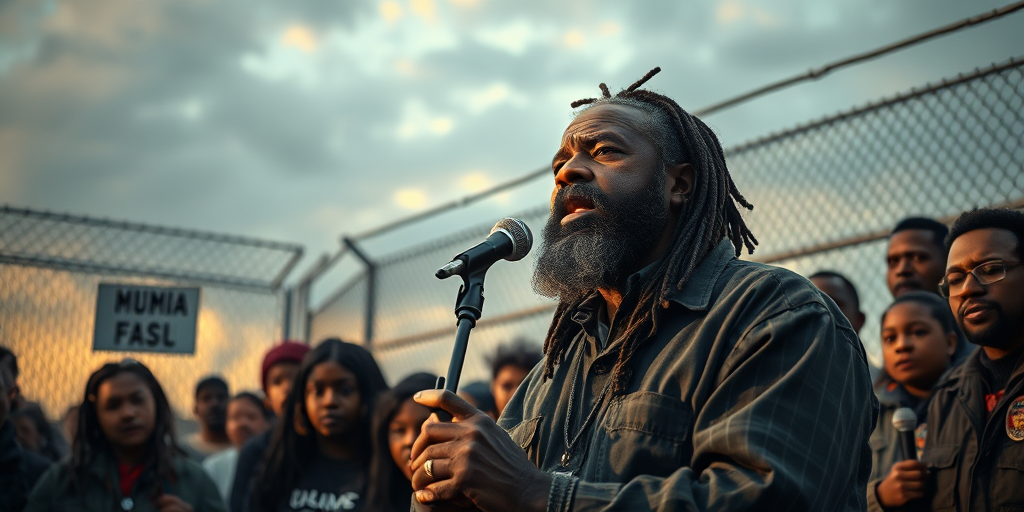Mumia Abu-Jamal’s Unwavering Support for LGBTQ+ Rights
Mumia Abu-Jamal, renowned journalist and activist often referred to as the “Voice of the Voiceless,” has garnered attention yet again, not just for his relentless fight against systemic injustice but for his continued and evolving advocacy of the LGBTQ+ movement. Despite being incarcerated since 1981 for the murder of Philadelphia police officer Daniel Faulkner—a conviction mired in controversy and claims of judicial misconduct—Abu-Jamal’s voice remains potent in the socio-political landscape.
A Revolutionary’s Embrace of Queer Liberation
Abu-Jamal’s advocacy for the LGBTQ+ community is not recent but has grown more pronounced over the years. His engagement with queer issues became notably public in 2000 when he spoke out against the brutal murders of LGBTQ+ individuals, aligning himself with campaigns like Rainbow Flags for Mumia, initiated by Leslie Feinberg. In his poignant commentary, Abu-Jamal critiqued the deep-seated hatred prevalent in American society and urged for collective action rather than relying on state mechanisms like the police.
Huey P. Newton, co-founder of the Black Panther Party, had once vocalized support for gay liberation as part of the broader struggle for human rights—a sentiment that resonated with Abu-Jamal. This reflective stance on intersectionality was ahead of its time and has continued to influence Abu-Jamal’s perspectives and advocacy.
Local Impact: Empowering the Community
Abu-Jamal’s progressive stance on LGBTQ+ rights has implications that resonate beyond the walls of incarceration, impacting communities fiercely advocating for equality. As a figure whose words are disseminated through platforms like Prison Radio, Abu-Jamal’s support fortifies grassroots efforts within the LGBTQ+ community, underscoring the importance of solidarity in fighting for broader social justice.
In Philadelphia and the greater LGBTQ+ community, Abu-Jamal’s activism serves as a beacon of unity. The sentiment is shared by LGBTQ+ advocates in Philadelphia who assert that his inclusive liberation philosophy bridges gaps between movements, fostering a unified front against oppression. “Mumia’s unwavering solidarity echoes throughout our community. His advocacy reminds us that our struggles are interconnected,” says Jasmine Rivera, a local LGBTQ+ rights activist.
Historical Context and Community Ties
The history of Abu-Jamal’s legal and advocacy battles is interwoven with the racially charged atmosphere of Philadelphia in the late 20th century. Targeted for his vocal opposition to police brutality—a defining narrative of his career—Abu-Jamal’s companionship with the LGBTQ+ movement began well before incarceration, during his active days in the Black Panther Party.
Philadelphia has its roots deeply embedded in civil rights struggles, reflecting national tensions surrounding race and justice. The city’s legacy of activism provides a fertile ground for Abu-Jamal’s narrative to spur continued action among residents and activists. Historical parallels drawn from cases like his galvanize local movements urgent in their call for comprehensive justice reforms and inclusive policies.
Future Directions: The Path Ahead
Looking forward, Abu-Jamal’s advocacy raises the question of how communities can further harness his revolutionary spirit to amplify marginalized voices. In an era where anti-LGBTQ+ sentiments appear resurging and legislative measures threaten rights, Abu-Jamal’s messages of unity and resilience are as pertinent as ever.
His work encourages the expansion of platforms for marginalized voices, reinforcing the necessity for movements to engage with a diverse range of issues from racial injustice to queer liberation. “Mumia’s legacy is living proof that resistance can thrive even under the harshest of conditions,” states Dr. Rebecca Black, a scholar in social justice movements, emphasizing the enduring impact of Abu-Jamal’s advocacies.
Resources and Continued Engagement
Organizations and community members interested in advocacy and education on issues surrounding racial and LGBTQ+ justice are encouraged to engage with platforms like Prison Radio and the International Concerned Family and Friends of Mumia Abu-Jamal. These resources offer archives, essays, and commentaries channeling Abu-Jamal’s voice, continuing to educate and inspire action among communities.
Furthermore, residents of Pennsylvania and the broader United States can participate in events, workshops, and forums to address systemic discrimination, echoing Abu-Jamal’s comprehensive message of unity and liberation. Through sustained efforts, bolstered by voices like Mumia Abu-Jamal’s, communities can transform allyship into actionable change, cementing an inclusive future for all.
In summary, Mumia Abu-Jamal’s enduring advocacy for the LGBTQ+ community, rooted in a fight against systemic discrimination, carries profound significance. His message encourages introspection and action, leaving an indelible mark on the intersection of racial and social justice movements, proving that solidarity transcends barriers, even those as formidable as prison walls.







